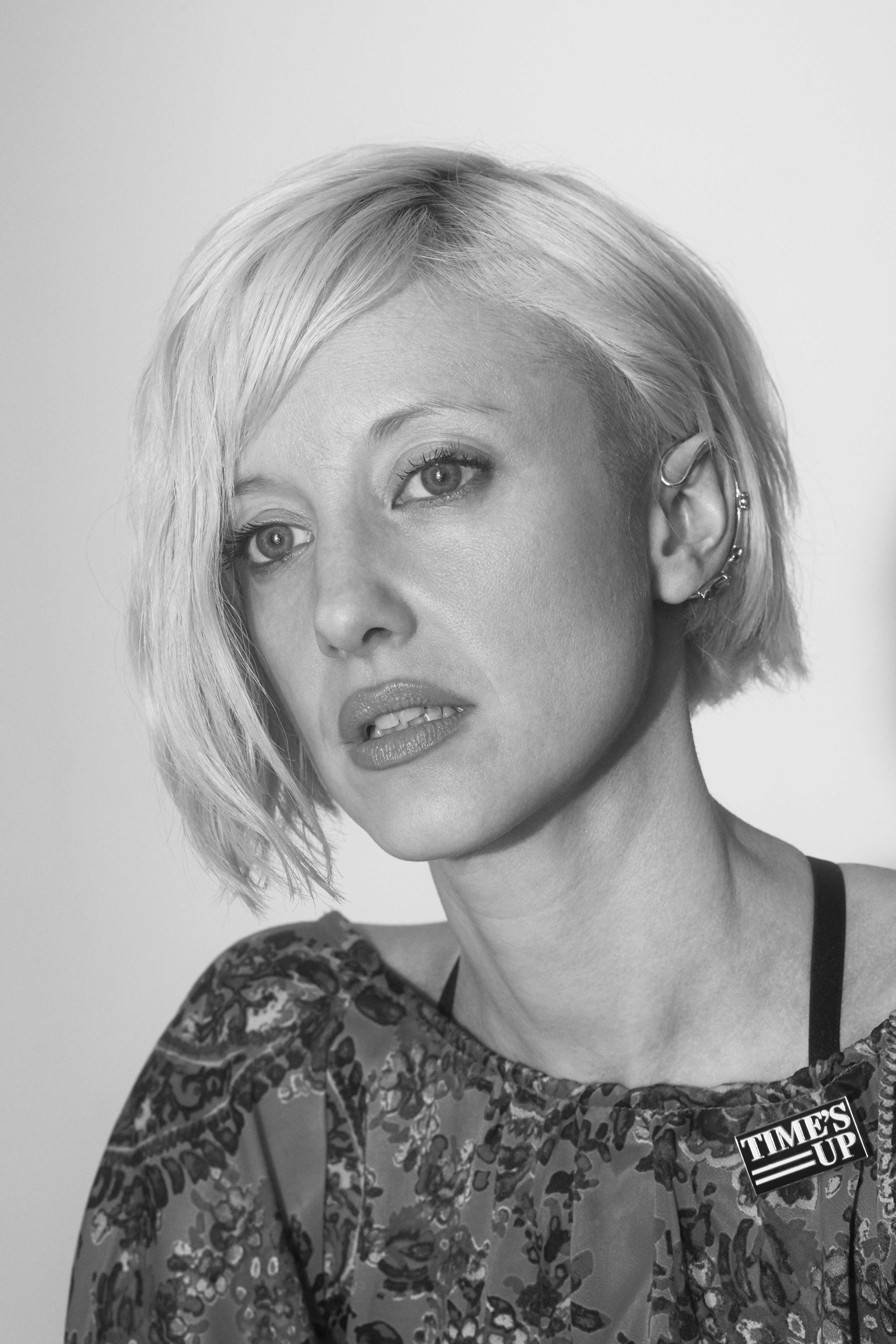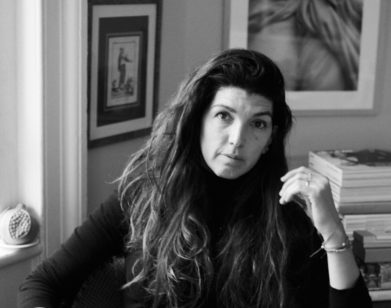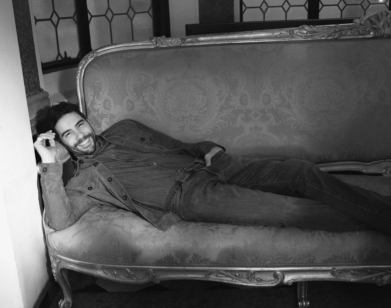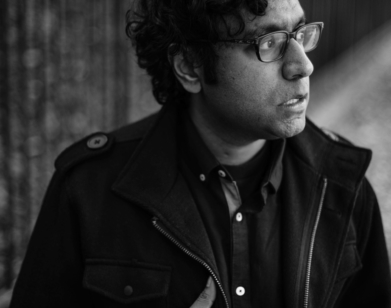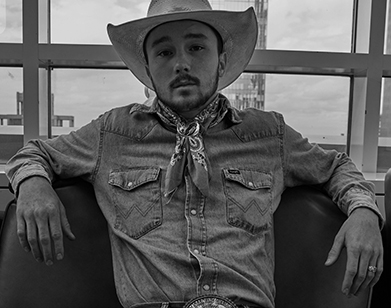How Waco’s Andrea Riseborough and Melissa Benoist humanized a cult
Waco is more than just a city in central Texas. It—the word, the place, everything Waco represents—is also a milestone, a landmark of religious fervor and governmental blunder in the sordid side of the American imagination often overlooked. It is synonymous with David Koresh, the self-proclaimed prophet that lived on the city’s fringes, the religious cult he presided over, and the military siege that left over 75 of its brainwashed members dead.
Waco is also the name of a new TV miniseries on the Paramount Network (formerly Spike TV). The show stars Taylor Kitsch as David Koresh who spars with FBI agent Gary Noesner, played by Michael Shannon. In only six episodes, it attempts to tell the stories of those both in and outside of the compound, often seeking to humanize the players on either side of a conflict without obvious “good” and “bad” guys.
Kitsch’s Koresh is played with notable charisma, and even at times portrayed with a transparent sympathy that overlooks or downplays the abuse he inflicted on his followers, which, according to survivors’ testimonies, ranged from beatings to statutory rape. It falls, then, on the women of Waco, Melissa Benoist and Andrea Riseborough as two of his “wives,” to put faces to the daily exigencies of life in a cult.
Their characters often find themselves caught between runaway devotion and the emotions that it simultaneously provokes and seeks to suppress. Benoist’s Rachel Koresh, for example, is a strong-willed devotee of her husband and his teachings, but nevertheless betrays twinges of jealousy in forfeiting him to other women. Riseborough’s Judy Schneider is more reticent in her beliefs, but is still at some point willing to give up her pre-existing marriage and have a child with her prophet.
It’s a tall order for six episodes to not only revive the humanity of these women outside of their all-encompassing statuses as misguided “cult members,” but to also embody their psychologies, contradictions and dreams. When I ask if they would’ve liked more screen time to explore their characters, Riseborough is quick to respond: “Yes, I mean, welcome to being a woman!”
EVAN SIEGEL: Was there anything in particular you wanted to bring to the televised version of Waco?
MELISSA BENOIST: Because the women were the majority [of people in the compound], and because of the circumstances they were living in—in the middle of nowhere on the Texas plains, with no running water and very meager living conditions—these women were extremely strong. In terms of Rachel, especially, she had never lived in the “outside world.” She was a Davidian her entire life. So that was a launching point for me, to rationalize her perspective of things.
ANDREA RISEBOROUGH: What was amazing was having access to the footage of the people who we were trying to not only reflect but honor, because they were real people—they had families and lives. We got to see exactly how they moved and talked. Even though the final tapes can be accessed by anyone on YouTube (they’re public domain), the final tapes are where they’re really fighting for their lives. All the Davidians are giving testaments as to how much they believe in their community, and what a strange spin the media’s putting on what’s happening inside the compound, and they want to get the truth out. And even though they’re in a very fraught situation at that point, you really get a sense of who they are as a community. They all had such different lives, didn’t they?
One of the really disappointing things about having opened up this conversation about the Waco women—the women who were in the Branch Davidian compound—and I was asked it on the red carpet more than once, “So you play one of the wives?” Which is just so insulting! To them! I mean, Judy Schneider Koresh was the matriarch of the community—that’s my character—and Melissa’s character, Rachel, really held things together till the very last. Without those two women, I’m not sure that even the people who survived would have survived. It’s tragic how many people died. It’s amazing that anyone survived, really, given what the FBI did to them.
SIEGEL: I’ve read things about David Koresh beating many members of the community and treating them horribly, which obviously differs from the David in the show.
RISEBOROUGH: We worked with David Thibodeau, who wrote a book about Waco, on which the series is based. He’s one of the nine survivors. He was with us on set everyday, which was a luxury, as was [former FBI Negotiator] Gary Noesner, so Michael was talking to him all the time. We really only had Thibodeau’s perspective, and he was so enamored with David.
Objectively, the situation there was horribly dysfunctional, especially sexually—deeply dysfunctional relationships going on that were inappropriate and abusive. From the inside, that’s a very human response to being rallied by a very strong, dominant personality, isn’t it? It’s that response of admiring them, rather than pitting [people] against them, you know what I’m trying to say?
BENOIST: I know exactly what you’re trying to say, and I do think you’re right.
SIEGEL: Do you think the women in the show are given enough space to tell their own stories, or assert their own individualities outside of what David was forcing on them?
RISEBOROUGH: I didn’t feel that way. I’ll speak for myself.
BENOIST: No.
RISEBOROUGH: I very much went into it hoping to give the Branch Davidian female plight better service than I was able to. But I think the women who were involved, we did everything we could. There were so many components to the story we were telling, because it was from so many different angles as well. It wasn’t just about the Davidian plight, or the Davidian “mess.” It was a whole bunch of other disasters going on at the same time. There was little time to get into really meaty conversations about what it was like to be a female Davidian. Such as, we both sleep with the same man … Was there ever that kind of conversation? I feel like we addressed it, but because it’s such a huge conversation and there’s so much to cover that we didn’t get into the meat of that, which would’ve been interesting.
BENOIST: I felt the same way. Even in the respect that the women were so much more involved in the siege and a part of the purpose of what Andrea is talking about, about how we had so much ground to cover. Kathy Schroeder had logged a lot more minutes than what we were able to portray on the phone with the FBI. I think they were just more involved and had more power than we were able to delve into.
RISEBOROUGH: As a woman as well, when gravitating or not toward a project, you come to a brick wall where you have to make a decision whether you actually want to do the best job of representing these people who really suffered, and be part of this, and show up and be the female face, even though it’s maybe not as strong a message as you’d like it to be from a female perspective, or whether you just exclude yourself entirely. On set, as women, we were very involved. Even though you may not see us a lot [laughs].
Annika [Marks] is a perfect example of that, who played Kathy. Her character was hugely influential with the negotiations with the FBI and the Davidians, but it’s not brought up in the script. We were on set, day in and day out, experiencing the feeling of what it’s like to play second wheel to an egomaniac. We really lived that—Taylor did a very good job of playing an egomaniac. [laughs]
SIEGEL: Agreed. I acknowledge that my question was a little bit difficult to answer, because, especially given the conversations we’re having about the entertainment industry at the moment, you’re almost trapped into representing “women” in this fucked up situation. There are a lot of politics that go into that. With that said, I was wondering what you feel about Koresh’s character being portrayed so sympathetically? We already touched on this a bit, but I wanted to ask more directly.
BENOIST: What’s difficult is that, by the end of filming this, we all garnered a lot of sympathy for the Davidians as a whole. I was gutted by putting myself in the shoes of what they went through. That’s difficult, but there was always, in every conversation we had, “Well, yeah, but he was doing this, and this, and this.” And he was sleeping with all the women and he had how many children.
RISEBOROUGH: You put somebody like Taylor [Kitsch] who has a large body of work that a lot of people have access to, and he has huge fan support, and immediately people are going to love somebody like him playing that role. Personally, I think if you watch somebody like that and you watch his actions, regardless of how sympathetically he’s playing it, you’d be a little morally bereft to think, “Oh God, he’s doing such a great job here.” [laughs]
BENOIST: I think it’s ingrained. The weird parts of it are just there, regardless of how he plays it.
RISEBOROUGH: It was a madly dysfunctional situation, and there was abuse. It’s all in context, and that’s my opinion. It’s really important to try and see it from every perspective, in order to understand it and come together, rather than point fingers from a distance. Taylor did a really good job of making the role empathetic. He truly tried to look at it from David’s perspective, and I’m sure that wasn’t a great place to be in for three months. It was not a great space for any of us to be in.
As a woman, on any film or any show, we do most of the emoting. When the women are burning to death, and suffocating, and trying to calm restless children, that’s a really difficult job. It took everything in me to call on those resources, just daily, to think, “I’m telling this story for a larger [purpose].” We reenacted the deaths of all the women and children suffocating underground and then burning to death. It was horrendous. We had children on set, and it was difficult for everyone: just the reality of what they went through, and how poorly the FBI behaved as well. It was shocking. If you really look into it, have a bit of a read—you read for about five minutes and realize, right, this became a huge political baton to be passed back and forth. It became a bargaining tool, the David Koresh situation. And sadly, a man was villainized who was behaving terribly. But not only was he stopped, tens of people died, because of how the FBI handled it, and because of how the Clintons handled it.
BENOIST: That being said, you have to be empathetic for all of them. The story we were trying to tell is that, humanizing him, and showing him justifying all his actions, whatever the motives were, and however egomaniacal he was—he was a human, and none of them deserved to die in the fire.
WACO AIRS WEDNESDAYS ON PARAMOUNT NETWORK.

